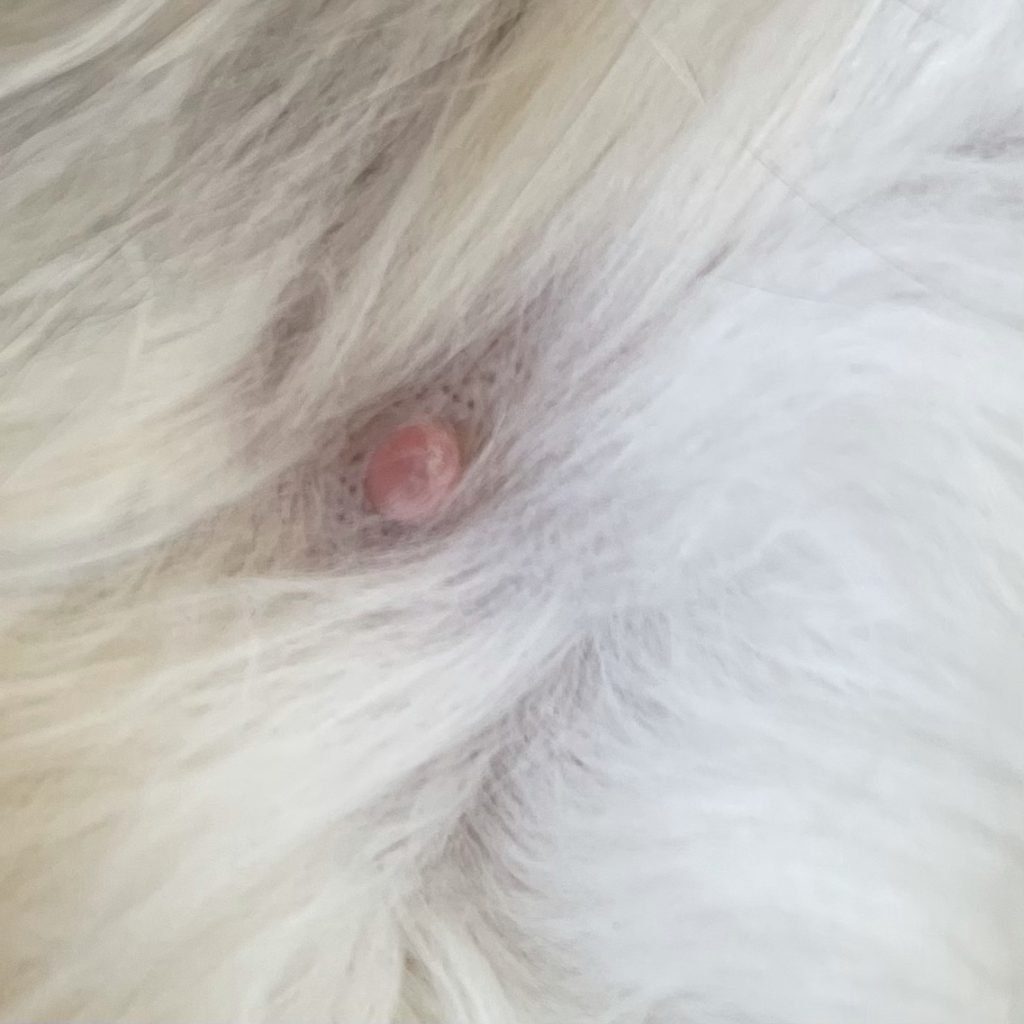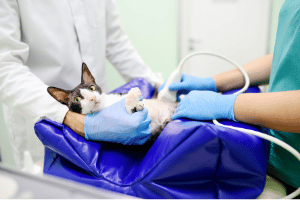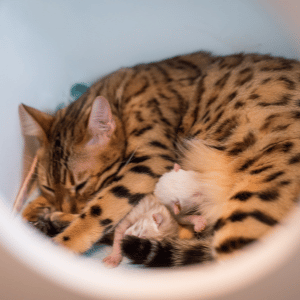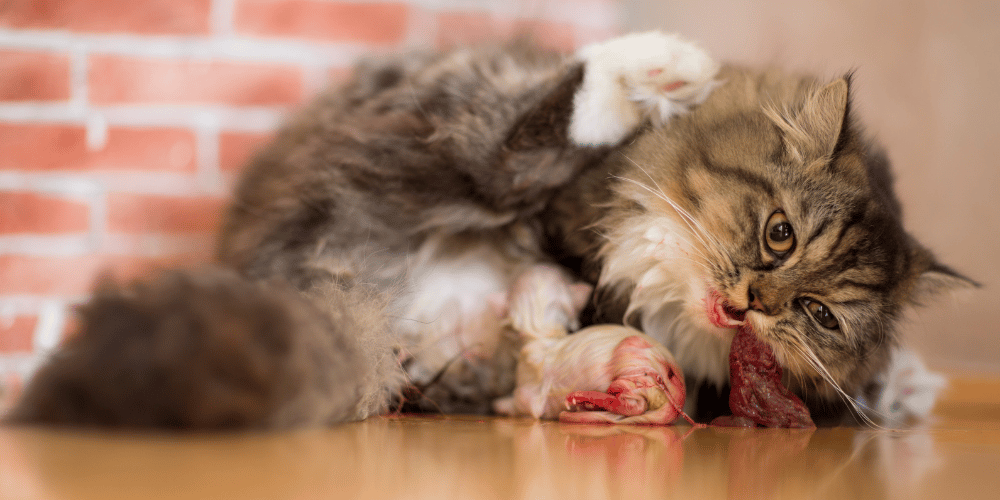What To Expect When Your Cat Is Expecting
It’s always exciting when you mate your Queen for the very first time. In most cases, you’ve acquired your breeding cats as kittens, and have watched them grow up and mature into beautiful cats. You introduce your queen to your sire and they get down to business. Once mated, the day will finally arrive when you get to see what type of offspring your cats will produce. Since there’s no official cat pregnancy test like a human has, here’s how to tell if your cat is pregnant.
As a general rule of thumb you should always have your Queen seen by a veterinarian and make sure that she is in optimal health before allowing her to mate.
This Podcast Episode will explain in detail the signs and symptoms that you can look for to conclude that she is pregnant, and start planning for the new litter of kittens. Check out this episode to get some tips on setting up your nursery and kitten room.
Cat Pregnancy Symptoms
Pregnancy always causes great physical changes in a female’s body. Most of them we aren’t able to physically see until the later phases of her pregnancy. Typically you won’t be able to detect or confirm pregnancy in your Queen for a couple of weeks. During the typical gestation period for a cat of 65 (9 weeks) days, you’ll start noticing changes around day 21. Until then, you’ll just be waiting patiently to confirm whether or not your Queen has babies on board.
Here are some of the signs to help you tell if a cat is pregnant:
- Hot Pink Nipples: One of the first signs that will tell you that your cat is pregnant is her nipples. Due to the surge of hormones in her body around 18-21 days into gestation, her nipples will turn a hot pink rosy color and become swollen. This is known as “pinking up”. Be sure to have a look at her nipples before you mate her so that you can compare what they looked like prior. Then start checking her around day 18 for signs of color and appearance change.

Morning Sickness: As a result of hormonal changes, your Queen may experience “morning sickness”. You may wake up to find that she has had a rough start and has barfed up her last meal. This is completely normal and should only last for a couple of days. If she continues to vomit longer than that, be sure to talk to your veterinarian.
Heat Cycles will Stop: Most females (but not all) will have an estrus cycle every 3 -4 weeks. Once your cat becomes pregnant, her heat cycles should stop. If you’re keeping track of her cycles, and she’s regular then you’ll notice when she misses. This is a good indicator that she is pregnant. If she’s not regular and more of a random girl, then this will not apply to you.
Weight Gain: If you weigh your cat prior to mating, and then weigh her again around 3 weeks after mating, you’ll see some weight gain if she is pregnant. The average female gains 2-4 pounds. This significant weight gain rule may not apply if she is carrying a singleton. You may not notice any change in her physical appearance during her whole pregnancy.
Pregnant Cat Personality

Increased Affection: Around 4 to 5 weeks into her gestation period, your Queen may become more affectionate toward you. This behavior is welcomed by basically every breeder that you’ll ever meet. You may notice louder purring and her asking for more attention than she has in the past. There isn’t a more pleasing sight and sound than a happy pregnant Queen.
Sleeps More: Your pregnant Queen may find herself taking a few extra naps than usual. It’s hard work carrying a kindle of kittens. 🙂
Pregnancy Tests for Cats
Unfortunately, there are no early pregnancy tests for cats. The pregnancy really can’t be detected until around the third week of pregnancy. Once you start noticing the signs from your Queen, everything will make sense.
At different times during her pregnancy, you can take her for a visit to confirm, to check that everything is looking good and healthy inside and to get a kitten count.
Palpation Method:
Your veterinarian can feel the cats’ abdomen and tell if the cat is pregnant.
When using the palpation method, you are feeling for swelling in the uterus, and the presence of kittens. This can usually be done around day 17-25 day of her pregnancy. This method is the least stressful for your Queen, so you can ask your vet to show you how to properly palpate your cat’s abdomen so you can perform this at home.
If there are only one or two kittens, the palpation method may not be accurate for confirming a pregnancy.
Ultrasound for Pregnant Cat:
An ultrasound can be performed on your Queen as early as 3 weeks of her gestation. This is the most accurate method if you’re trying to determine if your cat is pregnant. The ultrasound can look for heartbeats, movement of the fetuses, and clear fluids (black on the ultrasound) surrounding a fetus. Ultrasounds are not the best method for counting kittens.

X-Ray for Pregnant Cat:
At around day 40 to 45 of the pregnancy, the bones of the kittens become calcified and can now be seen on an x-ray. You’ll literally be able to count the skulls and spines inside the Queen. X-Rays are the best method for counting the number of kittens to expect upon delivery. This method is only accurate after day 45 of the pregnancy.
How to Tell If a Cat Is Pregnant
- Pink Nipples (After Day 21)
- Morning Sickness
- Heat Cycles will Stop
- Weight Gain
- Sleeping More Than Normal
- Palpation Confirms Kittens
- Ultrasound Confirmation
- X-Ray Shows Kittens
During the exciting times when your cat is expecting, you might feel nervous at the idea of your cat going into labor. Be prepared by knowing the signs leading up to and during the delivery of her precious kittens. Preparation in advance is key to helping your cat have the smoothest possible delivery. Cats are quite independent and private in delivery, often able to give birth unsupported. However, you should watch quietly from a distance in case you need help or to call a vet. Listen to this podcast episode where we talk about what to expect when your cat is expecting.

Get the Training and Support That You Need
When you become a member today, you’ll have instant access to a personal mentor who will be there for you and give you the answers you need.
Not only this, you’ll also get access to:
- Step-by-Step Training Courses about Breeding Cats
- Full Blueprints for Marketing Your Cattery and running your business professionally
- Unlock TikTok For Your Cattery with the course on Viral Video Creation
- Digital Resources and Tools
- Invite Only to our Discord
- Exclusive Deals on SpaySecure and Sensei Store
- Monthly “Members Only” Training Calls
Pregnant Cat Behavior Before Birth
The average gestation duration of a cat is normally between 63 and 65 days (nine weeks after fertilization). The week before delivery, you will find that your cat’s behavior and routine may change. She will start to search around for every nook and cranny in the house. She is looking for a safe place to birth her kittens. So providing a quiet, warm, and comfortable environment for your cat will help them feel at ease during the process.
It is a good idea to set up a kittening box; keep it in a warm and draft-free area, and this is critical as during the kitten’s first three weeks of their lives, they are unable to regulate their own temperature.

Moments before delivery- signs to watch out for
During the first stage of labor, her birth canal will relax and widen as her kittens start to turn around into the correct position for birth. After that, you will start to notice your cat’s behavior changing drastically. She will start to become very restless, frantically walking from one area to the other while becoming very vocal by meowing that can be occupied with groans.
Similar to humans, cats will go through several stages of labor. Refusing food 24 hours before birthing is typical, so don’t worry if she lacks interest in eating. The first stage can last anywhere between 6-12 hours on average, and if it’s your cat’s first time expecting, then don’t worry if it lasts up to 36 hours- this is normal.
As the hours progress, these meows may become more intense. Loud purring is also common. She may display signs of “nesting,” and this is when she scratches and paces around her kittening box. When you know she is about to deliver; you’ll notice that she will start settling down from her restless state.
How Do I Know When My Cat is in Labor?
The average gestation period of a female cat is about 65 days. You’ll want to start looking for any signs of your cat going into labor around day 62, and through day 70 if she hasn’t delivered yet.
Being able to read the body language of your cats is an amazing gift. If you’re able to recognize her “normal” behavior then it will be a piece of cake for you to tell when she is in labor. The use of her verbal and non-verbal language will give you all of the signals that you’ll ever need.
First Signs of Labor:
The first stage of labor is the one that you’ll always be looking for those signs that your cat is labor. This is the stage that you’re primarily focusing on during this podcast episode.

The contractions aren’t physically evident yet, but you’ll notice behavior from the Queen that validates her “getting ready” process.
During the first phase, the cervix and the vagina are relaxing. Her body temperature will drop below 100 degrees F. The intermittent contractions will begin, but only the Queen will know that this is happening. Queens may linger in the first stage for 36 hours.
You’ll never forget the first labor and delivery of a litter of kittens that you sit through with your Queen. It’s a rush of adrenaline, as well as very exhausting. After several litters, you’ll start to become familiar with the behavior patterns of your Queens. The signs will indicate that labor is approaching and that the kittens will be here soon!
How Long Does It Take A Cat To Deliver Kittens?
The average time for your cat to deliver all her kittens is up to 16 hours. This typically depends on how many kittens are present, if it is your cat’s first pregnancy (first-timers normally take a bit longer) and if there are any difficulties with the birth. For first-time cat mothers, it can take a considerably longer time for the first kitten to be born.
You will know when your cat is ready to give birth as she starts to undergo strong contractions as the kitten moves down the birth canal, and straining begins. This is when the second stage starts to commence. The birth of the first kitten should normally occur during the first 30 minutes when straining first occurs.
How To Help A Cat Deliver Kittens
Typically, it takes around three pushes for the delivery of each kitten, and the kitten’s water bag is visible at the vulva. This will burst, and your cat will clean up most of this liquid and tear/lick the membrane from the kitten’s face, which helps stimulate breathing. Although it is unnecessary to intervene in anything during the process, if you notice that your cat doesn’t remove the membrane from the kitten’s mouth and nose, you should step in and do this for her.
You should follow up by carefully and gently rubbing the kitten with a soft towel, as this will stimulate breathing in the kitten. The subsequent kittens should follow in approximately 15 minutes to one-hour intervals. However, interrupted labor can happen when your cat stops straining and starts nursing the kittens already born or to rest.
The final third stage involves the delivery of the afterbirth and often occurs in between the delivery of each kitten. The afterbirth consists of the placenta and other fetal membranes. Although, sometimes, the kittens are delivered very quickly, don’t worry if it seems like stage three labor has been delayed.
After delivery, your cat will chew the umbilical cord in two, and eating the placenta is common. You will have to do this for her if she doesn’t chew the umbilical cord. You mustn’t pull on the umbilical cord as this could result in an umbilical hernia. Kittens should crawl toward the mother’s nipple and begin to nurse- this helps stimulate the uterus to contract. If the kitten doesn’t move to nurse, you should carefully place the kitten in position.

When to call the vet
During delivery, it is important to monitor her birthing process closely. However, in most cases, mother cats will instinctually know what to do. Too much unnecessary involvement can be quite stressful for your cat; nevertheless, there will be occasions when you’ll be required to step in and perhaps call the vet.
Although cats tend to have fewer problems than dogs when it comes to birthing, you should look out for the following problems that will require seeking veterinary attention.
First, you should call your vet if the first stage lasts longer than 24 hours without any signs of straining, and if your cat has been straining for more than 30 minutes without birthing any kittens, it could be due to an obstruction (a very large kitten). If your cat suddenly seems weak, call your vet immediately.
A week before the due date, it is advisable to take your cat to the vet for a final check-up, and you can use this opportunity to ask any questions and potential problems. They will know what is “normal” and when to seek veterinary attention.
Nature Has a Way of Creating Beautiful Things
There’s so much to learn when it comes to a cat’s heat cycle, pregnancy, and delivery of her kittens. your role as a breeder is to make sure that everything goes smoothly and be there for her in the event that something goes wrong. Let nature teach you everything you need to know about your Queens! Be observant and tuned into her, and you’ll learn more from her than anywhere else.





